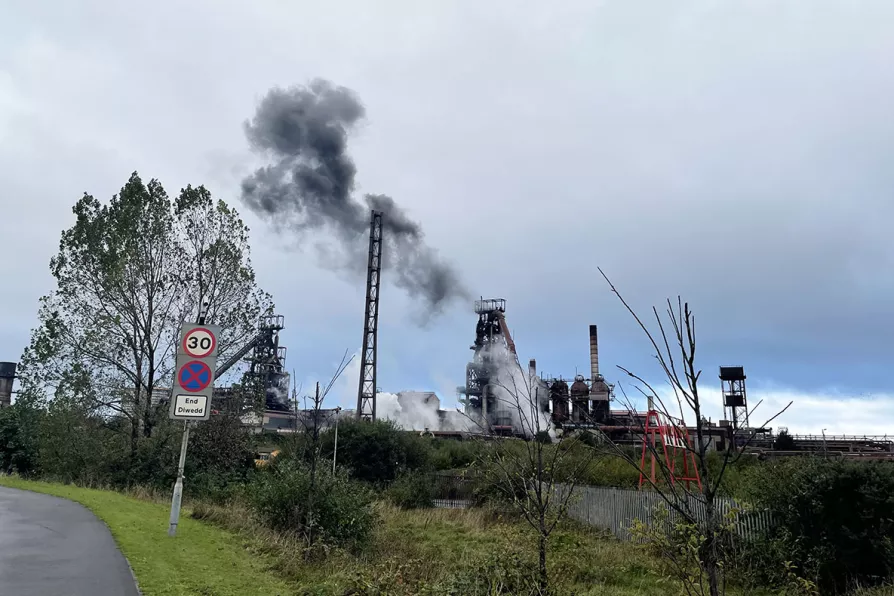This weekend, the NEU holds a special conference to debate changing its approach to organising teaching assistants, which a 2017 TUC agreement forbids. General secretary DANIEL KEBEDE outlines the choices before delegates
LUKE FLETCHER pours scorn on Labour’s betrayal of the Welsh steel industry, where the option of nationalisation was sneered at and dismissed – unlike at Scunthorpe where the government stepped in

 Tata Steel in Port Talbot, as the last blast furnace at one of the biggest steelworks in the world shuts down, September 30, 2024
Tata Steel in Port Talbot, as the last blast furnace at one of the biggest steelworks in the world shuts down, September 30, 2024
IN SEPTEMBER 2023, it became clear — as many of us had feared — that the UK government’s backroom deal with Tata Steel would come at a devastating cost: 3,000 job losses, with Port Talbot set to bear the brunt.
On January 19 2024, the worst was confirmed, and fears became fact.
The decision, made with chilling indifference, has devastated thousands of skilled, unionised workers and communities that have sustained the Welsh economy for generations. The damage doesn’t end at Port Talbot’s boundary. Workers from Bridgend and the Vale to Swansea and Carmarthen were cast aside.
With the closure of Port Talbot’s blast furnaces, primary steelmaking would come to an end in Wales. Welsh and UK governments, along with Tata Steel, allowed the steelworks to wither on the vine. They presented this neglect as environmental responsibility, even as Tata maintained blast furnace operations in India and the Netherlands. This was never about decarbonisation — it has always been about profits.
Faced with this crisis, Plaid Cymru made it clear: there is another way. We made the case — forcefully and repeatedly — for public ownership. The state should not be a passive bystander while a private corporation, reliant on public subsidy, strips Wales of its assets. Steel is too important — to our economy and our communities — to be left at the mercy of market forces.
On January 24 2024, Plaid Cymru secured an urgent debate in the Senedd to put nationalisation on the agenda. From this point onwards throughout the year, Labour dismissed the idea outright calling it “student politics,” a “pipe dream” and a “red herring.”
They told us to wait. A future UK Labour government, we were assured, would be able to have a different kind of conversation with Tata. In February, they had announced a £3 billion fund for the UK steel industry — all would be fine.
So when Keir Starmer took office in July 2024, I was clear: before he spent his first night in No 10, we needed real answers about what Labour’s promises to steelworkers were truly worth.
By October, blast furnace 4 was shut down. A generational legacy erased in months. An act of industrial sabotage.
But last month came the cruellest contrast. In April 2025, with Parliament recalled in urgency, the UK government leapt to protect steelworks in Scunthorpe — nationalisation suddenly back on the table. Two thousand jobs were saved. And rightly so.
Every steelworker deserves protection, and every community deserves the backing of its government. But the question for Wales resonates loud and clear: why not Port Talbot? Why not the workers there?
All the excuses crumble under scrutiny. Ownership structures. Timelines. Geopolitical shifts. If action is justified in Scunthorpe in 2025, action was just as viable in Port Talbot in 2024. What changed wasn’t the economic case – it was the community.
When Plaid Cymru proposed nationalisation for Port Talbot – twenty-one times – we were laughed off.
Just this week, the First Minister Eluned Morgan claimed that pursuing the nationalisation of Tata’s operations in Port Talbot would have prompted the company to take legal action, effectively discouraging any such attempt. In doing so, she offers a grim portrayal of Wales as a nation beholden to multinational corporations – powerless to act in defence of its own industrial base for fear of corporate retaliation.
This stance doesn’t embody leadership; rather, it reflects a defeatist managerialism that prioritises risk avoidance over principle.
This betrayal stings all the more coming from Labour – a party forged in the crucible of the Welsh valleys and carried to power on a wave of Welsh support for over a century. Yet when the time came for Labour to act, the communities that had stood by them for generations were offered no protection – just a front-row seat to their own abandonment.
For generations, communities like Port Talbot have kept the furnaces burning, not just for Wales, but for the UK as a whole. To see them written off without a serious fight is to witness a government that has forgotten what solidarity looks like. And when our leaders echo the language of helplessness — when they tell us that nothing can be done — they aren’t simply seeking to avoid conflicts that may prove difficult; they’re erasing the very idea that democratic power can stand up to private interests when it needs to.
Wales deserves better than a politics of permission. Our leaders shouldn’t be asking whether standing up for their communities is convenient or legally tidy, but focused on doing what it right — leaders who understand that a nation’s future cannot be subcontracted to boardrooms in Mumbai or London.
Our politics has operated on the assumption that Wales must simply endure what others decide for it for far too long. Next year’s Senedd elections will offer the people of Wales an opportunity to change that.
Luke Fletcher is Plaid Cymru member of the Senedd for the South Wales West region.














